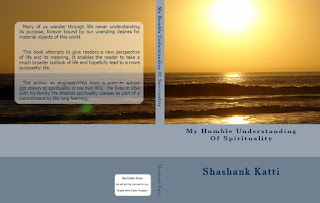I am giving a brief recap of what we have discussed about the Rurdram so far. Shri Rudram is a Vedic hymn dedicated to Ishvara in the form of Lord Shiva. This ‘order’ in which the universe is manifested, harmoniously exists is called as the Lord of the Universe or Ishvara. Recognizing this order and relating to Isvara by not rubbing against the order is the Vedic / Yogic way of life. The Veda gives us five different types of Yagnasto connect with Ishvara. Shri Rudram can be used as a Deva Yagna for connecting with Ishvara. The Dhyana Slokas of the Rudram visualize the lord as 1) a person 2) Universal form 3) Absolute Reality. Before chanting Shri Rudram, we purify the body by invoking various deities at our different parts of the body through a process called nyasam. Laghynaysam is a simplified form of nyasam.
The process of invoking the Divinity in us is to ensure that the various parts of my body be pure , guarded , governed and controlled by divine forces. The devotee requests that he should act with an awareness of divinity in his body. As part of the invocation, the various Gods from the Hindu pantheon are requested to come and reside in the body. I am giving below only some of the names of the Gods which are listed in the invocation.
- Let Brahma be in parts of creation - Creativity
- Let Vishnu be in my feet - Standing on our own feet
- Let Hara be in my hand – Remove sorrows
- Let Indra be in my shoulders – Face the situations
- Let Agni be in stomach - Digestion
- Let Lord Shiva be in my heart - Purity
- Let Vasu be in my neck - Connect with nature
- Let Goddess Sarawathi be in my mouth – Purity of speech
- Let Vayu be in my nose – proper breathing
- Let Sun and Moon be in my eyes – Proper vision
- Let Aswini devas be in my ears – good health
- Let Rudras be in my forehead – control of sense organs & mind
- Let Adhityas be in the front portion of my head – Clarity
- Let Mahadeva be in the center of my head – Complete control of the body, mind
- Let Vamadeva be in my tuft – over all protection
- Let Pinaki be at the back of my head - Fight negative tendencies
It may come as a shock to the non-Hindu and also to the "rational" non-believing Hindu as to why there are so many Gods in Hinduism and it is also a main point of ridicule of the religion. However, the criticism is not based on the underlying principles of the multiple Gods. Hinduism, just like any religion which has unraveled the truth is firm in its conviction of a Universal power or God. But what makes each of us unable to realize this universality is because of our individuality or ego. Anytime the ego is suppressed, we are nearest to the realization of universality. If we reflect and say, when are we happiest, it is obvious that we are happiest in deep sleep. At this stage, it does not matter whether we are rich or poor, manager or a peon etc. This happens because, ego is suppressed in deep sleep taking us closest to divinity. That said, it is obvious that any practice which enables us to forget our ego and acknowledge a higher power, brings us closer to the universal divinity and accompanying it is increasing bliss. So the ancient Indian teachers inculcated the principle of God in everything. For them, the tree was a God, the animal was a God, Nature was a God. The idea was that, when any of these encountered, we human beings full of ego, would be able to briefly acknowledge a supreme God and thus reduce our ego.
Let us look at another argument why humans need multiple Gods. Assume you go to a shop to buy clothes and the only thing available is of color pink. Trouser, shirt, saree, anything, the only color is pink. Next you go to a restaurant and the only thing available is bread. How would life be if variety was not there? Similarly, each of us as humans get emotionally linked to some concept of God and there is no way, that the emotional connect will be same for everyone. Someone may worship a stone as God, another may worship an animal and so on. The point of religion is to allow humans the ability to select any form of divinity as a hook or a means to think of a universal power and reduce their own ego state.
So, as part of the invocation of the Lord into our body, the prayer asks various Gods to be positioned in various parts of the body. What is the significance of this? If I invoke the Goddess Saraswathi, the god of knowledge to reside on my tongue, there is an invisible emotional gate which prevents me from talking bad when I have the Goddess on my tongue. Similarly, if I invoke the God in various parts of my body, the idea is that in the presence of God, I will not be tempted to do or think anything negative, thus leading to a temporary purification of oneself before chanting the Rudram.
Conclusion
The whole purpose of the Rudram is to enable us to achieve Divinity. Before the chanting of the Rudram, it is necessary to purify the mind so as to focus on the divine thoughts. Hence in the invocation, the student invoks various Gods to come and reside in his body as a symbol of purity.



No comments:
Post a Comment
Please leave comments for me here.